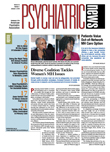Over the past 20 or so years, much has been learned about the heritability of various psychiatric illnesses. By 2003, the human genome had been entirely sequenced. Psychiatric geneticists are now in hot pursuit of specific genes underlying various psychiatric disorders.
Thus it should probably come as no surprise that psychiatric genetic counseling is getting under way as well. Jehannine Austin, Ph.D., an assistant professor of psychiatry at the University of British Columbia, made this announcement at the World Congress on Psychiatric Genetics in October (Psychiatric News, November 16, 2007).
Austin, it turns out, is one of the few persons in the United States and Canada who engage in psychiatric genetic counseling. So Psychiatric News contacted her, along with several others —Holly Peay, M.S., associate director of the genetic counseling training program at the National Institutes of Health; Christine Finn, M.D., a psychiatry instructor at Harvard Medical School and a medical geneticist; and Beth Sheidley, M.S., a psychiatric genetic counselor at New England Medical Center —to learn more about this burgeoning new field.
Various types of individuals seek such services, those experts said. Some have a family history of psychiatric illness and are concerned about their children developing it. Others have an affected child and wonder whether they should have more children because of the risks. Still others are affected themselves or have a spouse who is affected and worry about risk to their children. Unaffected siblings of affected individuals are also sometimes interested in learning what their chances of having an affected child are. And then there is the couple who, having learned that a child they are interested in adopting comes from a family with psychiatric illness, wants guidance on whether to proceed with the adoption.
In many instances, the counseling that these persons undergo helps them make informed decisions, Austin, Peay, Finn, and Sheidley indicated.
For example, Peay recently counseled a man whose wife had died from early-onset Alzheimer's disease. He was concerned that his teenage children might get early-onset Alzheimer's as well and wanted to have their DNA tested for the several genes known to cause this form of the disease.
Peay told the man, however, that if he had the DNA of his children tested, it wouldn't necessarily give him a yes or no answer, and even if it did,“ We couldn't prevent the disorder.” Peay also talked with him about his fears. The information and discussion “definitely helped him,” she said. “It was clear that he was just going to rush into DNA testing without a clear idea of what it could achieve or what the implications were.”
A “shockingly high number” of persons who come for psychiatric genetic counseling are afraid of having children because they have relatives with psychiatric illness, Austin said. Yet these persons tend to overestimate the risks, and explaining the real risks to them often eases their anxiety.
Finn described a case that illustrates this point. A woman whose father had schizophrenia was worried about her children getting the illness. Finn asked her what she thought the risk was. She said 50 percent, maybe even 90 percent. Finn told her that her own risk was only 10 percent and her children's even less—from about 1 percent to 3 percent. This information reassured her greatly, Finn said.
Nonetheless, only a handful of individuals are specializing in psychiatric genetic counseling, Austin, Peay, Finn, and Sheidley reported (see
How to Find Genetic Counselors). The tools used, with a few exceptions, are pretty basic—traditional family-history taking, not genetic testing or prenatal diagnosis. And the challenges of conducting such counseling can be daunting, they said.
Facing the Big Challenge
“I think the biggest challenge is the quality of information we have,” said Finn. “Right now we don't have specific tests, we don't have definitive answers. That can be very difficult for people who are used to yes and no answers.”
Sheidley agreed. She has been offering, as part of a research protocol, three genetic tests to parents who have a child with autism and who are afraid of having another child with the disorder. The tests can identify several rare causes of autism such as fragile X syndrome, but unfortunately no other genes that could be capable of triggering autism.
Also, “most people don't understand much about genetics,” said Finn. “That is an added obstacle. And I think the media portrays information about psychiatric genes that is much more definitive than it really is. So people come in with unrealistic expectations.”
Then there is the hurdle of whether health insurance will reimburse for genetic counseling in general. “If the indication is related to pregnancy or children, almost always,” said Peay. “It becomes harder for people who want to come and talk about a not-yet-conceived child. And it definitely gets more difficult when you deal with psychiatric genetics. I don't think the insurance companies get what the point might be.”
Furthermore, as “technology moves forward, it becomes more and more complicated to explain the meaning and limitations of genetic tests,” Sheidley pointed out.
Indeed, “this field is incredibly dynamic and changing all the time, and it's hard for those of us who specialize in it to keep up with it,” Peay admitted.
Looking Beyond the Horizon
So what is coming next? Will demand for psychiatric genetic counseling increase?
Austin and Peay both believe so. However, Sheidley is not so sure. The reason why, she explained, is that some time ago, individuals who were at genetic risk of Huntington's disease were asked whether they would want to be tested for it if a genetic test were available. Most said they would. But when such a test actually became available, many didn't want to go through with it.
And once it becomes possible for people to have their entire genomes sequenced at a reasonable cost—something that may happen as early as five years from now, Ronald Davis, Ph.D., director of the Stanford Genome Technology Center, reported at the World Congress on Psychiatric Genetics in October—will it improve the accuracy of psychiatric genetic counseling?“ Absolutely!” Peay said.
Finn, however, is only reasonably sanguine. “I hope that we can be more precise, more individual in our risk estimation.”
And Austin is even less confident. “While we may be close to being able to sequence a person's [entire] DNA inexpensively, we are still a long way from being able to interpret that sequence in relation to risk for psychiatric illness, or indeed many other illnesses. So even if we could sequence the DNA cheaply, it would not yet be able to tell us much about that person's risk for psychiatric illness.” ▪

